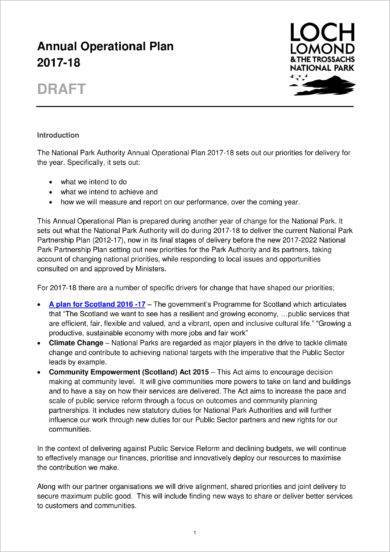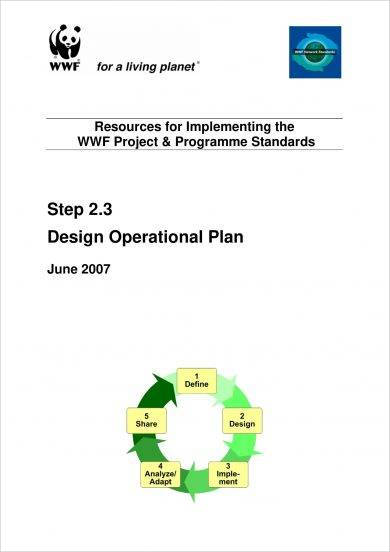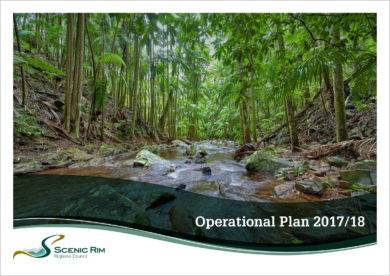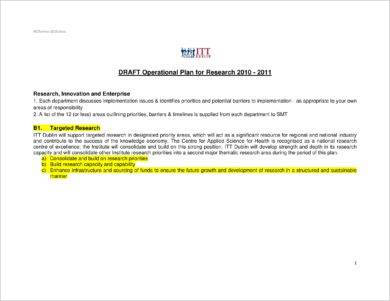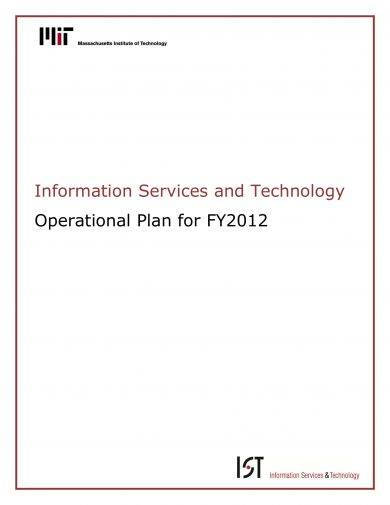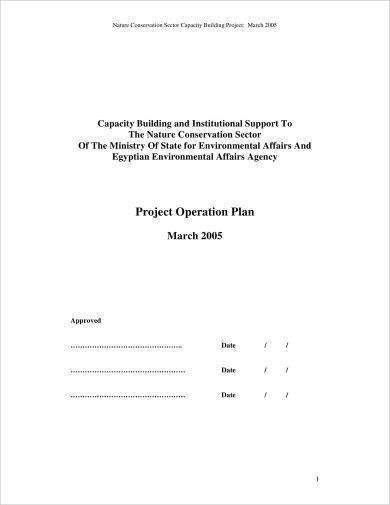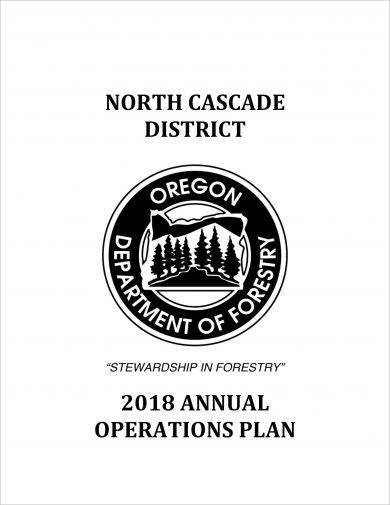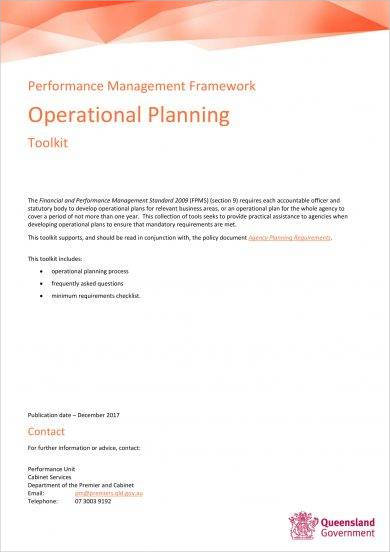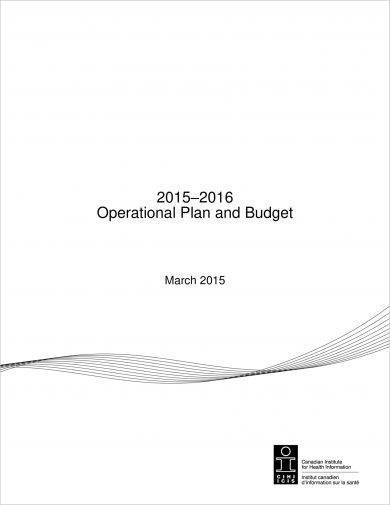9+ Project Operational Plan Examples to Download
Business entities must constantly plan and develop goals for the company to enhance and improve its systems and operation. These plans may be for long term, medium term, and short term.
Strategic plans are associated with the long-term strategies in achieving the objectives of a company, while tactical plans and operational plans are those associated with the medium-term and short-term strategies of the company, respectively. In this article, we will be focusing on the short-term strategies—operational plans.
These plans explain how a strategic plan be put into action during a given operational period. An operational plan is the basis for the annual operating budget request. Further discussion can be found in the later part of this article.
The next section will present several useful examples of project operation plan.
Annual Project Operational Plan Example
Design Project Operational Plan Example
Detailed Project Operational Plan Example
Contents in an Operational Plan
- The name, number, and description of the mission and professional goals of a certain department or agency or budget unit
- The program name and authorization for each program in a department or agency or budget unit
- The description of the program including the mission, goals, and activities for each program in a department or agency or budget unit
- The objectives of the program with link to strategic plan for each program in a department or agency or budget unit. You may also see annual operational plan examples.
- The program performance indicators for each objective for each program in each department or agency or budget unit
- The organization and program structure chart for each department or agency or budget unit
- The contact person or persons for the program
It must also have
- clear objectives,
- activities to be rendered,
- quality standards,
- desired outcomes,
- staffing and resource requirements,
- timetables, and
- progress monitoring process.
Outline of Operational Plan Format and Components
The program structures of different departments or agencies vary, but the usual format and components of an operational plan used by most organizations are as follows:
- Department/Agency Name
- Department/Agency Number
- Department/Agency Description:
- Department and/or agency mission statement
- Department and/or agency goals
- Program A Name
- Program A Authorization (Primary constitutional, statutory, and/or other citations)
- Program A Description:
- Program mission statement
- Program goals
- Description of program activities
- Program-wide performance information (optional)
- Program A Objectives:
- Objective No. 1
- Strategic link
- Performance indicators
- Objective No. 2
- Strategic link
- Performance indicators
- Objective No. 3
- Strategic link
- Performance indicators
- Objective No. 1
- Program B Name
- Program B Authorization: (Primary constitutional, statutory, and/or other citations)
- Program B Description: (General mission statement, goals, activities description, and optional programwide performance information)
- Program B Objectives:
- Objective No. 1
- Strategic link
- Performance indicators
- Objective No. 2
- Strategic link
- Performance indicators
- Objective No. 1
- Charts:
- Department/Agency Organization Chart
- Department/Agency Program Structure (with Activities) Chart
- Contact Person(s):
- Name, title, and contact numbers (telephone, fax, and e-mail)
- Department/Agency Contact Person (for entire operational plan); and/or
- Program A Contact Person Program B Contact Person
Draft Project Operational Plan Example
European Investment Bank Group Project Operational Plan Example
Information Services and TechnologyProject Operational Plan Example
Nature Conservation Project Operational Plan Example
To discuss further the above components of an operational plan, below are brief discussions on the guidelines on its main component. These are basic, generic requirements that are common in every entity’s operational plan.
1. Department/Agency Name, Number, and Description
The department/agency should be briefly described and should include its mission and goals, describing the context within which its programs operate. The agency goals must be reflected in program goals and objectives. You may or may not include department-wide or agency-wide performance information.
2. Program Name and Authorization
The program name as well as the the primary constitutional, statutory, or other references that pertain to the program including its activities must be cited. If state law is included in these references, the statutory citation is used rather than the legislative citation. You may also see business operational plan examples.
If federal law, administrative procedure, program guidelines, or court order is included, the public law, code, rule, case, or consent decree must be cited. In case there are modifications in the program names, it must be approved by the Office of Planning and Budget. You may also like operational plan for restaurant examples.
3. Program Description: Mission, Goals, and Activities
The description for each program must explain the need for the program and must include program mission and goals as well as a description of the activities within the program.
- Program mission and goals – the program mission describes what an organization does and whom it serves, while goals are the intended long-term results and are clear statements of the general end purposes toward which the efforts and plans are directed. You may also check out primary school operational plan examples.
- Program activities – the activities must be a distinct subset of functions or services within a program. It must be clearly identified and described. It should be written with the assumption that the reader has no knowledge of the activity. In this regard, the use of technical terms and acronyms should be avoided; if there are cases that jargon cannot be avoided, then these must be clearly defined. Moreover, the activity structure must also be illustrated in a program activity chart. The program structure should be in parallel to the activity structure for such program. You might be interested in hotel operational business plan examples.
4. Program Objectives
Objectives are intermediate outcomes and should be specific, measurable, attainable, result-oriented, and time-bounded (SMART). In order to set program operational objectives, you can address the following questions.
- What are the program’s strategic goals and objectives?
- What results are to be expected over the lifetime of the strategic plan?
- What strategies will be used in order to achieve the goals and objectives?
- How does this program’s operational plan relate to the simple strategic plan?
- What portion of the strategic plan will be ventured during the upcoming fiscal year?
Key Elements of an Operational Plan
1. Human capital
This pertains to the staff and skills required to implement your project and the current and potential sources of these resources. You may also see weekly plan examples.
2. Financial requirements
This refers to the funding required to implement your project and your current and potential sources of these funds
3. Risk assessment
This pertains to determining the current risks exist and the methods on how to address them
4. Estimations of the project lifespan, sustainability, and exit strategy
This refers to the length of time your project will last, how you will ensure sustainability of this project, and when and how you will exit from this project. You may also like work plan examples.
North Cascade District Annual Project Operational Plan Example
Performance Management Framework Operational Plan Example
Project Operational Plan and Budget Example
Tips to Stay Focused on Operational Planning
1. Firstly, you must see to it that the members of your team have an open mind for the discussion and have the necessary professionalism needed to discuss business matters as these are necessary for a successful planning session. You may also see risk plan examples.
You must set and condition your mind that you will be planning to achieve short-term strategies that can be applied to short-term plans. Your operational plans must also be in line with your strategic plans.
2. Everyone must know and expect that change is expected from this discussion. Stress that change must be done for the better; hence, you must brainstorm on how to improve and enhance what you have as of the moment. Even if you are already satisfied with the current performance or system, you must constantly assess the system so you will know if there are still rooms for improvement. You may also like daily plan examples.
3. You must know your capacity as an individual. If you think you can do the role of a facilitator, then initiate and do the first step in the discussion. Otherwise, you can hire a professional facilitator who will keep the meeting moving at a good pace and will maintain a less contentious atmosphere. You may also check out transition plan examples.
Hiring someone to facilitate would also give you an opportunity to participate in the discussion and to clearly think of suggestions and ideas, for if you will be facilitating the discussion, you are gathering and assessing the ideas from the members that you only have a short time to think for an idea on your own. You might be interested in quality plan examples.
4. Before you part ways, the suggested changes must be fully supported by the team and the team must have a unified decision. You must come up with a consistent message so that the dissemination of the information will also be consistent. If not, this may create confusion and misunderstanding within the entity. You may also see advertising plan examples.
5. You must know that complaining and self-pity do not create results; hence, they must be avoided. You have to acknowledge problems and then move into solutions. You must not dwell and linger on the negative; instead, be focused on what you can still do and improve to accomplish your simple plans.
6. Be positive. Focus on the things that you have accomplished in the past year and recount how you achieved such accomplishments. This will create a positive energy and motivate everyone in the team to do well this year too. They will be encouraged to work in order to achieve the goals that were planned. You may also like assessment plan examples.
7. You must hold each other accountable for the responsibilities no matter how small or big the task may seem. When everyone is held accountable for his or her actions, blame game is unlikely to happen. Everyone will do his or her job accordingly, fulfilling the designated responsibilities. You may also check out annual plan examples.
8. Find time to relax and have fun with your team. You deserve to have a break at times. This will help you be refreshed from the tight schedule as well as create a bond with the other members in your team.
Operational plans need to be specific and detailed, and this must be discussed with the team and properly decided to avoid any confusion. Should you want to have your own systematic and organized operational planning, the discussion above with regard to operational planning format and tips can surely help you, and you can always refer to the above examples of project operational plans.



